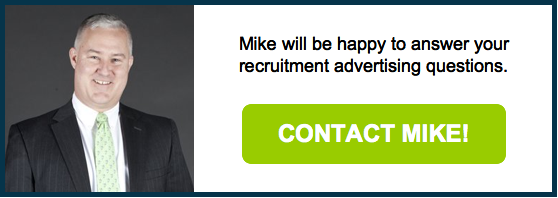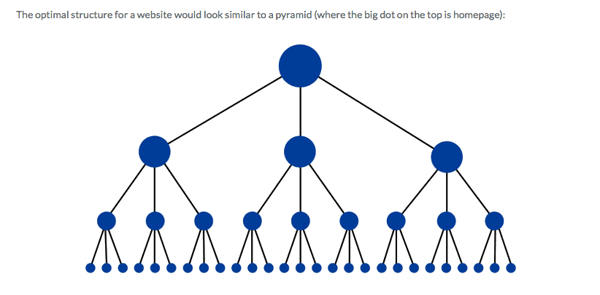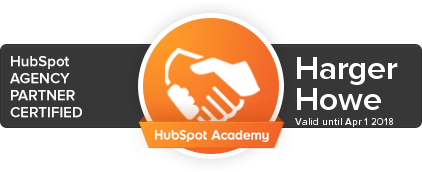In the recruitment marketing industry, it seems like we are always promoting link building strategies and there’s a definite reason. However, before I get into that, I’d like to cover what link building is (and the two types of links) as well as the difference between quality and quantity linking.
Internal Links
First of all, when you start a link building strategy, you need to consider both internal and external links. According to Moz, internal links are, “hyperlinks that point at (target) the same domain as the domain that the link exists on (source). In layman's terms, an internal link is one that points to another page on the same website.” These types of links are helpful because they allow the search engine spiders (like Google’s) to navigate or “crawl” through your website and assess all of your internal pages. According to Moz, internal linking helps with the following: “They allow users to navigate a website. They help establish information hierarchy for the given website. They help spread link juice (ranking power) around websites.”
So how can you help those spiders find all of your relevant site information? Well, you can start by trying to set your site up like the picture below from Moz.
This internal link structure will allow the spiders to nab all that great information you’ve created on the pages. In fact, Moz made a point to mention that popular sites like Amazon use this structure with great success.
In addition to setting up your website via the image above, you should also consider troubleshooting common reasons why your pages may not be getting indexed in the first place. Here are some areas Moz mentions that do not allow spiders to crawl effectively.
- Links in Submission-Required Forms
- Links Only Accessible Through Internal Search Boxes
- Links in Un-Parseable Javascript
- Links in Flash, Java, or Other Plug-Ins
- Links Pointing to Pages Blocked by the Meta Robots Tag or Robots.txt
- Links on pages with Hundreds or Thousands of Links
- Links in Frames or I-Frames
We encourage you to read the details of these internal link area issues here.
External Links
Now external links on the other hand are a totally different animal. According to Moz, “external Links are hyperlinks that point at (target) any domain other than the domain the link exists on (source). In layman's terms, if another website links to you, this is considered an external link to your site. Similarly, if you link out to another website, this is also considered an external link.” In fact, by linking to Moz, we are giving them an external link right now!
External links are extremely powerful when it comes to ranking. The reason for this ranking power is, “because the search engines consider them as third-party votes.” This way of thinking and strategizing just goes to show you what others are saying about you really matters when it comes to search engine optimization. According to Moz, search engines rank your website on all of the following:
- The trustworthiness of the linking domain.
- The popularity of the linking page.
- The relevancy of the content between the source page and the target page.
- The anchor text used in the link.
- The amount of links to the same page on the source page.
- The amount of domains that link to the target page.
- The amount of variations that are used as anchor text to links to the target page.
- The ownership relationship between the source and target domains.
Quality Vs. Quantity
We touch on this issue a lot in all aspects of our business. Just because you are producing a lot of something doesn’t mean that it’s hitting the mark. Focus on garnering quality external links and optimizing your own internal linking if you want to rank higher with Google.
Spam link providers, which are sometimes called “link farms” will not help you rank because Google considers them to be purveyors of low quality content and penalizes them with updates like Penguin and Panda. You can watch a great video from Moz here about link farming and why it should be avoided here.
So how do you build quality links? Well, it takes time, but here are some great places to start from a great Hubspot blog, Inbound Link Building 101: 33 White Hat Ways to Build Backlinks for SEO.
- Maintain a steady blog with great content.
- Link to other blogs on your blog.
- Write guest blog posts.
- Curate and publish helpful resource lists.
- Do expert roundups to build relationships.
- Write newsjack posts.
- Create case studies about your most impressive clients.
- Volunteer to be the subject of a case study.
- Administer surveys.
- Write book reviews.
- Conduct free webinars, and post archived copies online.
- Create free tools.
- Create shareable templates.
- Create compelling infographics.
- Create other forms of visual content.
- Create SlideShare presentations.
- Do something funny.
- Write press releases about interesting company news.
- Send out a joint press release when your news involves another company.
- Do some outreach when you have big news or a great piece of content.
- Set up press requests alerts and look for opportunities to send quotes.
- Write and pitch op-ed articles.
- Partner with companies in complementary industries.
- Do some co-marketing.
- Ask for reviews.
- Make friends with other webmasters in real life.
- Search for and monitor mentions of your brand.
- Search for and monitor your competitors' backlinks.
- Incorporate "Tweet This" links into your content.
- Install social sharing widgets.
- Sponsor or speak at an event.
- Help another webmaster fix an error on their site.
- Give away free trials and sneak peeks of your product.
Why Link Building Matters
So what’s the reason for creating and working toward an optimized SEO link strategy? Well? It’s simple…it’s going to increase your web traffic. In our business, that traffic translates to more business for our agency and more candidate applications for our clients via their recruitment microsites. And really, who doesn’t want more business or potential hires?!
--
SEO is a long-term game, but how do you track and read the results? We recommend you write down some goals and if you are still confused...contact us!











